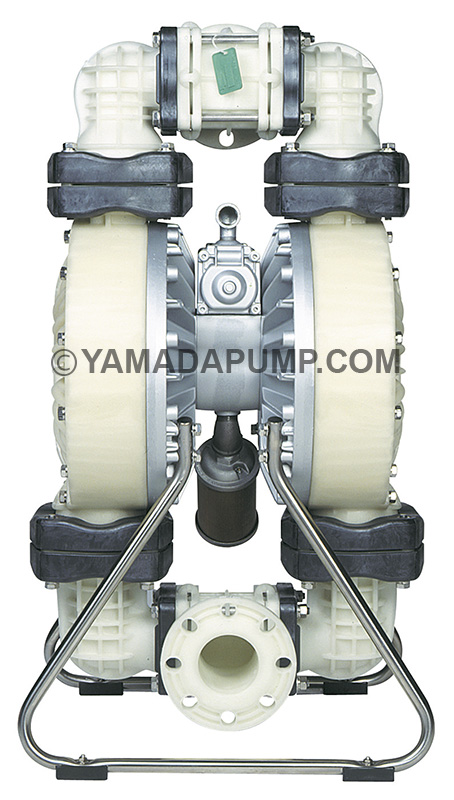Yamada # 852727 Air Operated Double Diaphragm Pump

Yamada # 852727
Yamada catalog # 852727, NDP-80BPS Air Operated Double Diaphragm Pump and Air Motor unit, with Polypropylene Body construction, Santoprene Diaphragm, Santoprene Ball-type Check Valve, EPDM O-ring. Inlet Port is 3 inch ANSI Flange 150lb, Discharge Port is 3 inch ANSI Flange 150lb.
Price : $ 5899.50
Product Information :
The Yamada 852727 is a NDP-80BPS Air Operated Double Diaphragm Pump and Air Motor unit, with Polypropylene Body construction, Santoprene Diaphragm, Santoprene Ball-type Check Valve, EPDM O-ring, with 3 inch ANSI Flange 150lb Ports. The Yamada NDP-80 series Aodd pumps provide a maximum flow rate of 215 gallons per minute. This pump has a Aluminum air motor, with a 3/4 inch Female NPT air inlet fitting that includes a ball valve, and a 1 inch Female NPT air exhaust fitting that includes a silencer. The pump's air motor is operated using an air supply of 20 to 100 PSI, and is capable of 95 cycles per minute with the rubber diaphragm or 160 cycles/min with the PTFE diaphragm. The pump does not include an air muffler on the motor. This pump is self priming and has a suction lift capacity of 19 feet. Pumps are available in aluminum, stainless steel (316), Kynar (PVDF), groundable acetal, and polypropylene construction. What separates Yamada from the rest of the pack is our air valve technology. Yamada uses a completely non-lubricated main air valve and independent pilot mechanisms to control the air logic. As compressed air enters the pump, it is directed via the main air valve to one side or the other, depending upon the starting position of the c-spool. As the air enters the chamber, it forces the diaphragm outward. This outward momentum forces liquid out of the discharge ball valve and loads the opposite inlet ball valve. As the diaphragm travels outward, the connected diaphragm on the opposite side is pulling the diaphragm inward. When it travels a full stroke, it will contact the pilot valve, depressing it and breaking the seal to open an exhaust port. The open port allows the compressed air to the exhaust from the back side of the air valve. The pressure drop produces a shift of the main air valve. This motion simply repeats on the other side. Theis pump is fitted with a Ball-type check valve which is recommended for flooded suction applications.
WEIGHT : The Yamada 852727 weighs 161 Lbs.
Features :
Applications
There are many applications that the Yamada 852727 are used in where a flow rate of up to 215 Gallons Per Minute is required. Typical applications for this pump include Filter Presses, adhesives, paints, chemical additive, winery pump over transfers, general wastewater transfer, drum pumps, tanker unloading, spraying, dosing, pigments, colorants, flavorings, filling machines and mixing tanks all use diaphragm pumps to manage their fluid handling systems. Common fluids pumped with the Yamada 852727 include industrial paints, polymers, hardeners, varnishes, lacquers, greases, adhesives, latex, acids plus bases and titanium Dioxide or fumed silica powders that require mixing and blending at various temperatures and flow rates. Some of the most common acids pumped are Hydrofluoric, Sulfuric and Nitric. Some of the most common finished products pumped are wines, paints and various adhesives or coatings. A double diaphragm pump can continuously transfer single or plural components through the up and down stream avenues of a fluid handling system. An air operated double diaphragm pump is typically used where air is readily available, and the characteristics of the application are better suited for the technology. If you have solids, a thicker liquid, selfpriming requirements, dry running potential, explosion proof specs, variable flow rates, shear sensitive liquids, something submerged, portability required, or the application calls for dead heading, then a diaphragm pump is an excellent choice. Things like sumps, tanker unloading, and simple water or chemical transfer applications are the most common and basic. There are process or more challenging applications for the technology also in industries like carpet manufacturing, paint plants, pharmaceutical facilities, semiconductor fabs, the printing industry and powder transfer. Each application will have their own requirements and the pumps can be modified accordingly to achieve the flow rates required while also maintaining long pump lives.